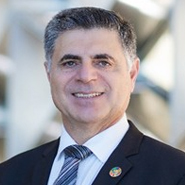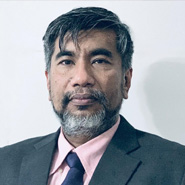The 15th Asia-Pacific Conference on Combustion (ASPACC 2025) in Singapore will feature three dedicated industry sessions, highlighting key advancements in sustainable energy and decarbonization. Join us at ASPACC 2025 to engage with industry leaders, researchers, and policymakers shaping the future of combustion and clean energy solutions.
Industry Session 1: Hydrogen and Low Carbon Fuel
Organizer: Professor S. Mani Sarathy, King Abdullah University of Science and Technology
Hydrogen and low-carbon fuels are emerging as key solutions in the transition toward a sustainable energy future. This session will explore advancements in hydrogen production, storage, and utilization, including green and blue hydrogen, ammonia as a fuel, and hydrogen infrastructure development. Experts will also discuss biofuels, synthetic fuels, and e-fuels, addressing their role in industrial applications, power generation, and transportation. Key challenges such as scalability, cost, and policy frameworks will be examined.
Invited Speakers:

Professor Bassam Dally
King Abdullah University of Science and Technology
Saudi Arabia
Presentation Title: Hydrogen through pyrolysis of hydrocarbons: Potential, progress and challenges
Bassam Dally is a Professor of Mechanical Engineering, a member of Clean Energy Research Platform, and a member of Center for Renewable and Energy Storage at King Abdullah University of Science and Technology, KAUST. Over the last 34 years, Prof Dally has contributed seminal work on a variety of research topics related to energy conversion, sustainability and decarbonization. His work is focused on the development of new technologies to decarbonize industrial processes, mineral processing, energy systems, waste gasification, and fuel pyrolysis. He has published more than 380 peer reviewed papers in leading scientific journals and conferences, and his work attracted more than 11,200 citations (h-index=54), and he is named on four patents. He held many positions, including head of mechanical engineering, deputy director of the centre for energy technology (University of Adelaide), stream co-lead in the KAUST circular carbon initiative, Program co-chair of the 40th International Symposium on Combustion, and he is currently the president of the Saudi Arabian Section of the Combustion Insititute. He is the initiator and director of the national Future Cement Initiative in Saudi Arabia. He won many awards over the years, including ‘Energy Professional of the Year in South Australia’, and was awarded a Fellowship of the Combustion Institute.

Dr. Haoren Lu
Baker Hughes
Singapore
Presentation Title: Innovative and scalable decarbonization strategies in climate technologies
Haoren leads Technical Sales for the Climate Technology Solutions business unit within Baker Hughes. Based out of Singapore, he leads Baker Hughes' engagements with customers in the region who are seeking decarbonization solutions via carbon capture, utilization and storage (CCUS), hydrogen and low carbon power generation. He understands customers’ project-specific needs and provides an overview of Baker Hughes’ technologies across the CCUS, hydrogen and clean power generation value chains. He also drives collaboration efforts between the Baker Hughes technology teams and such customers to help develop relevant decarbonization solutions utilizing Baker Hughes technologies for their projects. Haoren has more than 18 years of experience spanning the CCUS and energy transition space. Prior to joining Baker Hughes, he was a Principal Consultant at NexantECA, where he led feasibility studies that covered process design and techno-economic assessments of novel energy technologies, including gasification, syngas clean-up, CO2 capture, oxy-combustion and hydrogen generation technologies.

Dr. Jun’ichi Sato
Decarbonized Industrial Thermo-System Center
Japan
Presentation Title: Use of decarbonized fuels in the industrial sectors
Dr. Sato was born in 1948. He graduated the Doctor course of Dept. of the Aeronautics, The University of Tokyo at 1976. He joined the Research Institute, IHI Corporation, as a researcher from 1976. He was promoted as Board Member and the Executive Managing Officer, Director General of Corporate R&D at 2006, President of IHI Inspection & Instrumentation Co. Ltd. at 2008, and then Advisor of IHI Co. at 2012. After these, he joined Center for Research and Development Strategy, Japan Science and Technology Agency as a Principal Fellow at 2016, and then President of Decarbonized Industrial Thermo-System Center from 2023. Beside these, he served as guest professors of Univ. of Bremen in Germany, Tsinghua Univ. in China, and Tohoku Univ. in Japan. He also served as Presidents of the Academic Societies named The Combustion Society of Japan, The Japan Society of Mechanical Engineers, and The Japan Federation of Engineering Societies.

Mr Wee Meng Tan
Global Centre for Maritime Decarbonisation
Singapore
Presentation Title: Ammonia as a marine fuel: Readying maritime ecosystem for the future
Wee Meng is the Chief Projects Officer at the Global Centre for Maritime Decarbonisation.
At GCMD, he leads the Projects team and provides strategic oversight on the centre’s key initiatives and projects. He is a member of the leadership team and works closely with the Chief Executive Officer and Chief Strategy Officer in aligning, resourcing and driving projects to deliver on strategic outcomes. Before joining GCMD, he was the Chief Technical Officer and Chief Sustainability Officer of Jurong Port responsible for shaping and execution of its ESG strategy.
Wee Meng is a member of the Technical Committee for Bunkering (Ambient Liquid Fuels), part of the Chemical Standards Committee of the Singapore Standards Council, and also a member of the Maritime Engineering Technical Committee of the Institution of Engineers, Singapore. Wee Meng holds a Bachelor Degree of Engineering (Electrical Engineering) from the National University of Singapore. He has also completed the General Management Programme at Harvard Business School.
Industry Session 2: Green Shipping and Decarbonised Marine Technology
Organizer:
Dr. Yichen Zong, Cambridge Centre for Advanced Research and Education in Singapore
Dr. Xinyi Zhou, National University of Singapore
With the maritime sector aiming for net-zero emissions, this session will focus on alternative marine fuels (hydrogen, ammonia, methanol and biofuels), vessel electrification, hybrid propulsion systems, and energy-efficient ship design. Discussions will explore emerging regulations, onboard carbon capture solutions, and digital technologies enabling the transition to green shipping.
Invited Speakers:

Ms. Pauline Chua
The Maritime and Port Authority of Singapore (MPA)
Singapore
Presentation Title: Maritime Singapore decarbonisation: working towards 2050
Pauline Chua is the Deputy Director for Energy Efficiency and Next Zero Pathways in the Maritime and Port Authority of Singapore. In the role, Pauline formulates and implements policies and strategies to bring low carbon bunker fuels into Singapore.
Pauline has more than 15 years of technology related experience and have previously undertaken R&D portfolio management for the Ministry of Defence and at MPA. Pauline has a degree in Chemical Engineering from the National University of Singapore.

Professor Tie Li
Shanghai Jiao Tong University
China
Presentation Title: Ammonia engine combustion researches from fundamental to tugboat application
Prof. Tie Li is a professor in Shanghai Jiao Tong University (SJTU). He is the head of Institute of Power Plants and Automation, and director of SJTU-COSCO Joint Laboratory of Green & Intelligent Marine Power Systems. Before joining SJTU, he worked as an assistant professor in Hokkaido University from 2004 to 2011. His research interests include engine spray combustion and emission controls, optical diagnostics for spray combustion, and he has published more than 200 peer-reviewed papers in the relevant research field. He is a recipient of several academic awards, including the Elsevier Highly Cited Chinese Researcher (2014-2023), National Distinguished Expert of China, 59th JSAE medal award (2009), and SAE Ralph. R Teetor award (2013).

Dr. Chen YunTao
American Bureau of Shipping
Singapore
Presentation Title: From alternative fuels to electrification -- Maritime decarbonization from a classification society’s perspective
Dr. YunTao Chen is the head of the ABS Global Electrification Center in Singapore. He has a background in Aerospace Engineering with a Ph.D. degree from the University of Michigan. He started his career in the energy sector, held several positions in the US and Germany at Siemens Energy. Prior to joining ABS, he was leading the R&D team for sustainable solutions (such as battery energy storage systems and fuel cells) at Rolls-Royce in China. At ABS, Dr. Chen is leading the Global Electrification Center in Singapore to promote marine electrification in the Asia Pacific region and across the globe.

Dr. Dabiao Wang
Fuda Zijin Hydrogen Power Technology Co. Ltd, National Engineering Research Center of Chemical Fertilizer Catalyst, Fuzhou University
China
Presentation Title: Exploration and reflection on ammonia-hydrogen energy technology
Dr. Wang Dabiao is a scientist at the National Engineering Research Center of Chemical Fertilizer Catalysts (Green Ammonia-Hydrogen Catalysis Technology) at Fuzhou University. He is also one of the technical leadders of Fuda Zijin Hydrogen Energy Technology Co., Ltd. His primary research focuses on ammonia-hydrogen energy power systems and ammonia decomposition reactors. Dr. Wang has published over 40 peer-reviewed papers and holds more than 20 invention patents. Together with his team, he has developed a series of innovative products, including a 100-kilowatt-level ammonia-hyddrogen power generation system, on-site ammonia-to-hydrogen refueling stations, and industrial hydrogen protection stations.

Mr. Yoon Jang Yong
Value Maritime Asia Pte Ltd
Singapore
Presentation Title: Value maritime, onboard carbon capture since 2022
Mr. Yoon Jang Yong has more than 28 years in international maritime, covering various roles in ship-owning, ship-management, ship-operations, classification society, and now in green shipping. He also has an extensive understanding of Singapore shipping society, and their stakeholders.

Mr. Jack Jones
NYK Bulkship (Asia) Pte. Ltd
Singapore
Presentation Title: NYK's decarbonisation strategy and efforts for adopting ammonia as a marine fuel
Originally from New Zealand, he worked for NYK LNG Group in Tokyo Headquarters for a year from 2012 and then moved to NYK London to work on LNG carrier chartering, operations, and business development. After another NYK Tokyo HQ LNG Group posting from 2017 to 2019, he then moved to NYK Singapore as the commercial, operations and business development lead for NYKs energy division. In his current role he is responsible for a wide range of energy transport related market development including LNG carrier operations, hydrogen and ammonia supply chain, next generation bunker fuels and CCUS value chain creation. He leads new business development based on his Japanese sensibility and rich international experience.
Industry Session 3: Decarbonisation in Power and Industry Sectors
Organizer: Professor Huangwei Zhang, National University of Singapore
Heavy industries and power generation account for a significant portion of global greenhouse gas emissions, making decarbonization in these sectors a key priority. This session will address carbon reduction strategies for heavy industries and power generation, covering carbon capture, energy efficiency improvements, and fuel transitions to support a low-carbon economy.
Invited Speakers:

Dr. Ghenadie Bulat
Siemens Energy UK
United Kingdom
Presentation Title: Towards cleaner power generation
Dr. Ghenadie Bulat is the Head of New Technologies for Gas Services at Siemens Energy where he leads a global team of highly qualified experts. He drives the innovation and excellence in all disciplines required for the success of products of the future. Ghenadie joined Siemens in 2003, his experience includes more than 20 years of engineering and management within Product Development and Technology Innovation. Dr. Bulat obtained his PhD from Imperial College London, and his engineering degree from Technical University of Moldova. He is a Chartered Engineer, a Member of Institution of Mechanical Engineers, The Combustion Institute, and a visiting professor of combustion at Imperial College London.

Professor Yi-Bing Cheng
Foshan Xianhu Laboratory and Wuhan University of Technology
China
Presentation Title: Carbon-free ammonia combustion technologies for decarbonisation in high temperature manufacturing industries
Professor Yi-Bing Cheng is a Professor and Strategic Scientist of the National Energy Key Laboratory for New Hydrogen-Ammonia Energy Technologies, Foshan Xianhu Laboratory, Guangdong Province and Professor of Wuhan University of Technology, China, and Emeritus Professor of Department of Materials Science and Engineering, Monash University, Australia. He is an elected Fellow of the Australian Academy of Technology and Engineering. He was an academic staff at Monash University between 1991 and 2018. He specialises in materials science and technology and has worked in a wide range of materials and processing technologies. His current work at Foshan Xianhu Laboratory is to develop carbon-free fuel combustion technologies for high temperature manufacturing industries. He has over 600 research publications, including papers in Science, Nature, Nature Materials, Nature Energy, Nature Photonics etc. He has been named a Highly Cited Researcher by Clarivate Analytics between 2018 and 2024.

Mr. Seung Woo Lee
Engine Engineering Design Group / Hyundai Motor Company
Republic of Korea
Presentation Title: Potential of 100% NH3 ICE for the decarbonized power source
Seung Woo Lee is working as a Senior Research Engineer/Global R&D Expert in Engine Engineering Design Group at Hyundai Motor Company, South Korea. He received his Master’s degree in Yonsei University and worked as a visiting researcher at the University of Birmingham for hydrogen generation using internal combustion engine.
He has researched for the future technologies of the internal combustion engine since development of serial production engine, His current research focuses on the carbon-free fueled internal combustion engine such as hydrogen and ammonia.

Dr. Toshiro Fujimori
IHI Corporation / Tohoku University
Japan
Presentation Title: Power generation with fuel ammonia
Dr. Fujimori earned his Ph.D. in mechanical engineering from Tohoku University. Since beginning his career at IHI, he has contributed to a variety of development projects in the field of combustion technology for over 35 years. He has developed technologies for low NOx gas turbines, twin fluidized bed gasifiers, and oxy-fuel combustion boilers. In the field of ammonia power generation, he has contributed to the development of gas turbine and boiler combustion technologies. From 2014 to 2018, he served as the Principal Investigator of the Japan national project SIP. Currently, he oversees the formulation and promotion of IHI's strategy for the development of next-generation energy technologies. Beginning in 2022, he will also assumed the role of Professor at the Institute of Fluid Mechanics at Tohoku University.

Dr. Shaik Mohamed Salim
Institute of Sustainability for Chemicals, Energy and Environment
Singapore
Presentation Title: Safety for ammonia and hydrogen as alternative fuels to decarbonise power generation and bunkering
Dr Salim has more than 25 years’ experience in safety both in the public and private sectors. He is currently leading the Process Safety group within ISCE2 with an emphasis on Process Safety. His main research interests include generative AI safety and hybrid process assessment methodologies, combustible dust, fires/explosions, battery safety, hydrogen and ammonia safety and inherent safety for modular process technologies. He is also active in the Chemical Standards Committee in developing of several national safety standards in Singapore and is also a member of ISOTC 261/WG6 on additive manufacturing EHS. He is also an adjunct Associate Professor with Singapore Institute of Technology, a practicing Professional Engineer, a member of the Workplace Safety & Health Council’s Chemical Industry Committee, an Engineering Accreditation Board Evaluation Team member under Institution of Engineers Singapore, and an active reviewer for several Process Safety Journals.


 loading......
loading......